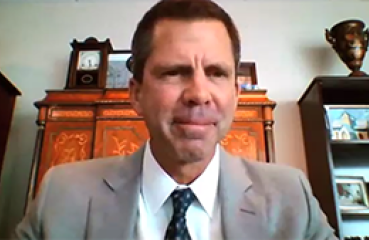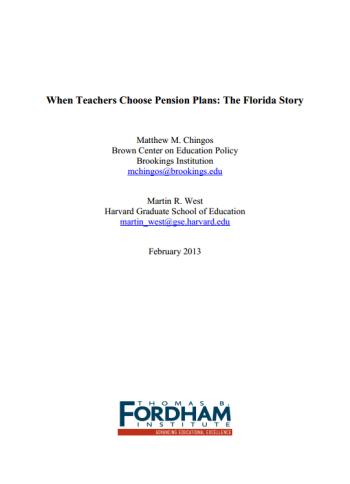First Bell 2-27-13
Pamela TatzA first look at today's education news: Mathematica Policy Research finds that KIPP charters produce substantial achievement gains, a union-run charter is granted a two-year reprieve despite mixed achievement results, and more
First Bell 2-26-13
Pamela TatzA first look at today's education news: English and U.S. History remain the most popular AP courses, high school dropouts cost $1.8 billion in lost tax revenue each year, and more
First Bell 2-25-13
Pamela TatzA first look at the education news from this weekend and today: Sequestration threatens 400 teacher and aide positions, CREDO finds that NYC's charters are quality, and more
First Bell 2-22-13
Pamela TatzA first look at today's education news: A new analysis of NAEP scores contains a plethora of information, Arne Duncan implies strongly that he may grant district-level NCLB waivers, and more
The Education Gadfly Show: Interview with John Kirtley
Following the release of Fordham's report, School Choice Regulations: Red Tape or Red Herring?, Mike Petrilli and Adam Emerson sat down with John Kirtley of Step Up for Students to talk about when private schools choose to participate in choice programs. While Fordham found that Catholic schools were less likely to be deterred by accountability regulations, Kirtley took a slightly different tack. Watch to find out more!
First Bell: 2-21-13
Pamela TatzA first look at today's education news: Teacher job satisfaction is at a twenty-five-year low, one in five students took and passed an AP exam, and more
Can bad schools be good for neighborhoods?
A government policy developed by mostly-benevolent leaders can do incalculable harm to those it was designed to help
Ending the SEA as we know it
When it a CRPE report on modernizing state education agencies, Andy is of two minds
First Bell: 2-20-13
Pamela TatzA first look at today's education news: a federally mandated commission issues a "blueprint" that harkens back to 1972, charter expulsion rates are no higher than those in traditional schools overall, and more
First Bell 2-19-13
Pamela TatzA first look at the education headlines from this weekend and today: NYC's school-bus strike is over, a study contends that charters select for students, and more
Fact-Checking the President on the Minimum Wage and Poverty
Michael J. PetrilliGood news: full-time workers with children in poverty have already been helped!
First Bell 2-15-13
Pamela TatzA first look at today's education news: More concerns over the president's pre-K plans emerge, MOOC providers struggle to catch cheaters, and more
School Choice Regulations: Red Tape or Red Herring?
Many proponents of private school choice take for granted that schools won't participate if government asks too much of them, especially if it demands that they be publicly accountable for student achievement. Were such school refusals to be widespread, the programs themselves could not serve many kids. But is this assumption justified? A new Fordham Institute study provides empirical answers. Do regulations and accountability requirements deter private schools from participating in choice programs? How important are such requirements compared to other factors, such as voucher amounts? Are certain types of regulations stronger deterrents than others? Do certain types schools shy away from regulation more than others? These are just some of the questions that David Stuit, author of the Fordham study, will discuss with a panel featuring John Kirtley of Step Up for Students (Florida), Larry Keough of the Catholic Conference of Ohio, and Paul Miller of the National Association of Independent Schools.
First Bell 2-14-13
Pamela TatzA first look at today's education news: Questions on the cost and viability of the president's pre-K plan abound, a parent trigger goes off without a hitch, and more
When Teachers Choose Pension Plans: The Florida Story
Matthew M. Chingos, Martin R. WestIn an era of budgetary belt tightening, state and local policy makers are finally awakening to the impact of teacher pension costs on their bottom lines. Recent reports demonstrate that such pension programs across the United States are burdened by almost $390 billion in unfunded liabilities. Yet, most states and municipalities have been taking the road of least resistance, tinkering around the edges rather than tackling systemic (but painful) pension reform. Is the solution to the pension crisis to offer teachers the option of a 401(k)-style plan (also known as a "defined contribution" or DC plan) instead of a traditional pension plan? Would this alternative appeal to teachers? When Teachers Choose Pension Plans: The Florida Story sets out to answer these questions.
First Bell 2-13-13
Pamela TatzA first look at today's education news: President Obama presented an aggressive early-childhood-education proposal in last night's State of the Union address, Michigan considers an expansion of the Education Achievement Authority, and more
First Bell 2-12-13
Pamela TatzA first look at today's education news: More than 6,200 students left D.C. public schools and didn't look back, watch for early-childhood education and college access in tonight's State of the Union address, and more
The unheralded virtues of grown-up policymaking, New Jersey-style
Take a broad policy directive, start a pilot, develop multiple external assessors, integrate this work with mid-stream RTTT-3 funds and a new tenure law, make course corrections, act with transparency about findings, and push on
Do demographic shifts explain cities’ test-score changes?
Aaron Churchill , Michael J. PetrilliExamining whether policies affect test scores
First Bell 2-11-13
Pamela TatzA first look at today's education news: California school construction puts future taxpayers on the hook for huge interest payments, lawmakers clash over how to hold states accountable for students' academic progress, and more
First Bell 2-8-13
Pamela TatzA first look at today's education news: Senate lawmakers held a hearing on NCLB waivers, second-generation immigrants outperformed the general American population in education, and more
Operating in the Dark
The United States faces a shortage of high-quality school leaders at a time when it is more apparent than ever that principals are key to attracting and retaining teacher talent and driving the improvement of student learning. While districts hire principals, states control the entry point to the principalship, overseeing the preparation and licensure of school leaders. Yet, to date, there has been no one central repository of information on state policies impacting principal preparation, licensure, tenure, and data collection to monitor the outcomes of those policies. The Bush Institute's new report, Operating in the Dark: What Outdated State Policies and Data Gaps Mean for Effective School Leadership, is a first-of-its-kind compilation of state-reported data on how the 50 states and the District of Columbia are using their authority to increase the supply of high-quality principals. Please join us for a presentation of the study's findings and a panel discussion, moderated by Fordham's Chester E. Finn, Jr., on how states can strengthen the rigor of the principal preparation program approval process and establish licensure requirements that validate and confirm that principals are indeed ready for the job and effective once employed as school leaders. The panelists will also discuss the role of the states in collecting data on principal effectiveness once school leaders are on the job and using that data to increase the supply of high-quality principals available for hire.
Department of Education rolls back the right to wheelchair basketball
Michael J. PetrilliFoiled by needlessly complicated government documents?
First Bell 2-7-13
Pamela TatzA first look at today's education news: MOOCs take a big step forward, food fights abound, and more




